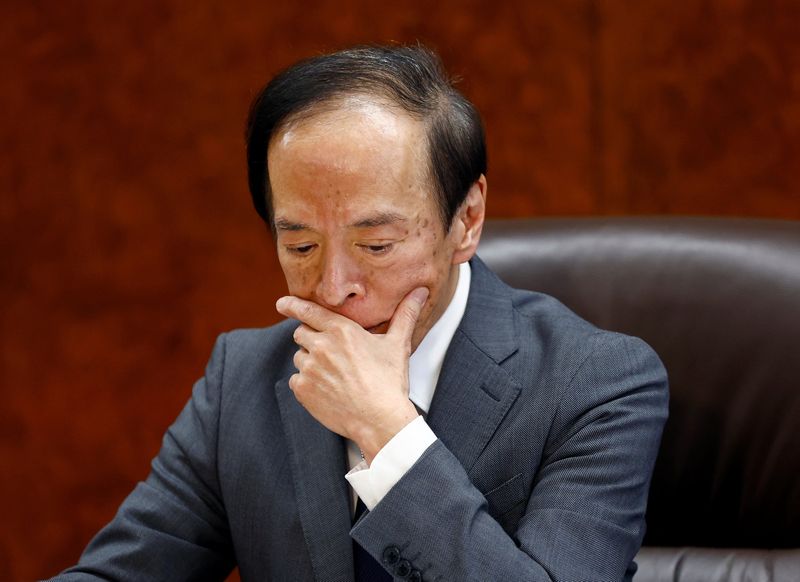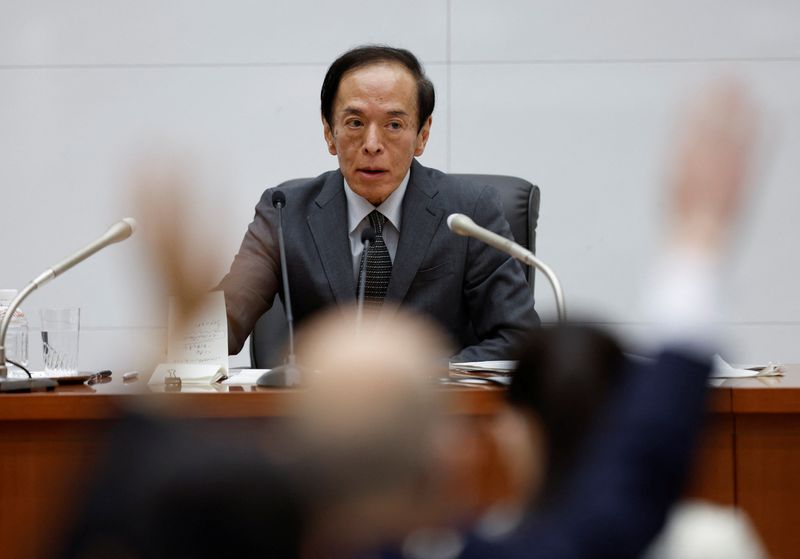By Leika Kihara
TOKYO (Reuters) -Bank of Japan Governor Kazuo Ueda said changing the central bank's policy target to the five-year bond yield, from the current 10-year zone, would be among options if it were to modify its yield curve control (YCC) policy in the future.
With falling raw material costs likely to slow inflation in coming months, the BOJ must avoid tightening monetary policy prematurely to ensure Japan sustainably achieves its 2% target, Ueda told a group interview with media on Thursday.
But he said the BOJ could make tweaks to YCC "if the balance between the benefit and cost of the policy shifts."
"If the BOJ were to modify YCC in the future, there are various ways of doing so," he said, adding that shortening the duration of bond yields it targets to the five-year zone from the current 10-year zone "could be among options."
"But I won't comment on whether we would definitely do so, how likely this could happen, or under what conditions the BOJ would see this option as desirable," Ueda said.
The remarks focus somewhat more on the possibility of a policy tweak than those in Ueda's speech last week, where he stressed the BOJ's resolve to remain an outlier amid a global wave of central banks raising rates to combat inflation.
In an examination of YCC in 2021, the BOJ said short- and medium-term interest rates had the biggest impact on economic activity. It also warned that excessive declines in super-long yields were undesirable as it could hurt pension returns and household sentiment.
That has led some analysts to bet the BOJ could shorten the duration of bonds it targets, and allow longer-term interest rates to rise more freely reflecting economic fundamentals.
Ueda said the BOJ could keep five-year borrowing costs stable and low even by maintaining its 10-year yield target, as long as the shape of the yield curve was a normal upward slope.
"This means that just because the five-year maturity has a strong effect (on the economy), it's not necessarily wrong to target the 10-year yield," he added.
IF WRONG, WE'LL ACT SWIFTLY
Markets are rife with speculation that Ueda, who took the helm in April, would phase out his predecessor's controversial policy that combines a negative short-term interest rate target with a 0.5% cap for the 10-year government bond yield.
Japan's core consumer inflation has stayed above the BOJ's 2% target for more than a year, casting doubt on its view recent cost-push price rises would prove temporary.
Ueda said he expects consumer inflation to slow ahead as global fuel and raw material prices have begun to fall.
"But we can't completely rule out the possibility that this projection could prove wrong," Ueda said. "If that's the case and if we see the need to revise our forecast, we'd like to act swiftly," he said.
The BOJ kept monetary settings unchanged last month but announced a plan to conduct a review of its past monetary policy moves, laying the groundwork to gradually phase out the massive stimulus deployed by former chief Haruhiko Kuroda.

Under the review, the BOJ would conduct various surveys and hearings including from regional areas of Japan, as well as workshops inviting academics and experts, Ueda said.
He said the BOJ should stick to its 2% inflation target, brushing aside calls from some academics to water down the price target to quicken an exit from ultra-loose policy.
